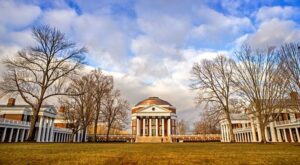Consider for a moment how much of a college or university’s budget comes from room and board, not to mention the prosperity of the surrounding economy.
Now consider the precarious position most colleges and universities are in America, beset on all sides by administrators, federal and state regulations, and a college campus culture that imposes students upon professors who stray from the current McCarthyism.
More than any other institution in America, our college campuses and universities are struggling with how to open up on-time with students packed into dorms in the face of a pandemic.
Which means one thing and one thing only: TAXPAYER FUNDED BAILOUT.
The University of Virginia’s endowment is enormous, standing at close to $7 billion dollars in 2019. Richmond, VCU, Washington & Lee, Liberty and Virginia Tech all stand north of $1 billion, with the College of William & Mary standing just under that $1 billion threshold.
Other institutions such as the University of Mary Washington? A paltry $50 million. Radford? $56 million. Longwood? $70 million. George Mason — one of the largest universities in Virginia — stands at $84 million. Mary Baldwin University? Just $33 million.
To put this in some perspective, Mary Washington’s annual budget is $129 million. Radford? $219 million. Longwood? Also $129 million. George Mason’s annual budget is a staggering $1.8 billion annually. Mary Baldwin (insofar as one can tell) stands at about $34 million annually.
Now those sound like small schools. So let’s add a bit of weight to it, shall we?
James Madison University? Has an endowment of $103 million and an operating budget of $341 million.
George Mason University? Has an endowment of $84 million and an operating budget of $1.8 billion (that’s with a -b, folks).
Old Dominion University? Has an endowment of $244 million and an operating budget of $530 million.
In short, Virginia’s colleges and universities — should they not open their dorms for the 2020-2021 academic year — are going to find themselves in more than just a pinch, but under serious threat.
Now, one could undertake the somewhat time-consuming exercise of adding up all of the room and board costs for one year and assuming that this might be the grand number that it will take to “bailout” our colleges and universities.
But the rough math doesn’t stop there.
Students who objectively look to go to institutions specifically for the social life and interactions (professors, students, clubs, etc.) might not be terribly chagrined to pay full freight for online classes.
After all, why pay UVA or William & Mary prices for Liberty University online experiences?
So admissions may very well drop off as students either defer or decline to attend university this year. All of this barely impacts the administrators who are federally funded, but the professors and actual educators who are not federally funded and entirely reliant upon tuition and fees.
Of course, colleges and universities can dip into their endowments… for at time. But as they slowly reopen (either in the Fall 2020 semester or in the Spring 2021 semester) one can imagine a nightmare scenario of lobbyists and lawyers beating down the doors of a Democratic-controlled General Assembly demanding their pound of flesh.
Meanwhile, what is to stop any student group from forming their own “autonomous zone” on every college campus in Virginia much less America?
Surely this is the warning coming from state and federal law enforcement now — that what you are seeing at present is set to become a permanent feature depending upon the November elections.
Coupled with demands for a bailout, one can see that this is no tempest in a teacup, but rather a deeply serious problem with an institution that has tremendous political clout.
Virginia’s colleges and universities are about to endure a one-two hammer shot that the public trust might not be able to absorb — and it’s something we need to start talking about and taking seriously today.
Shaun Kenney is the editor of The Republican Standard, former chairman of the Board of Supervisors for Fluvanna County, and a former executive director of the Republican Party of Virginia. This column was published originally by The Republican Standard.


Leave a Reply
You must be logged in to post a comment.